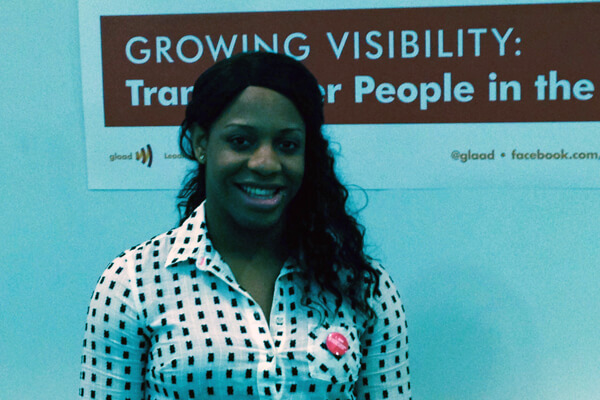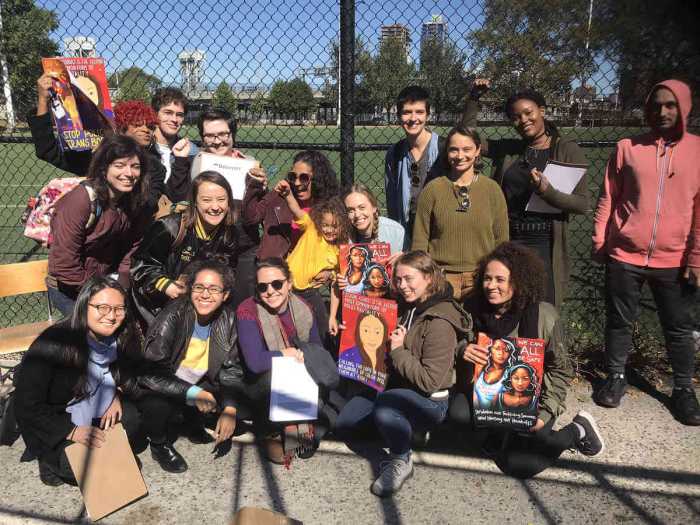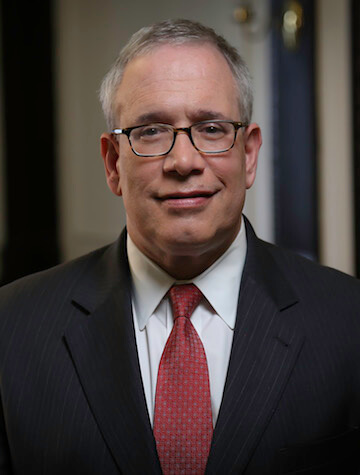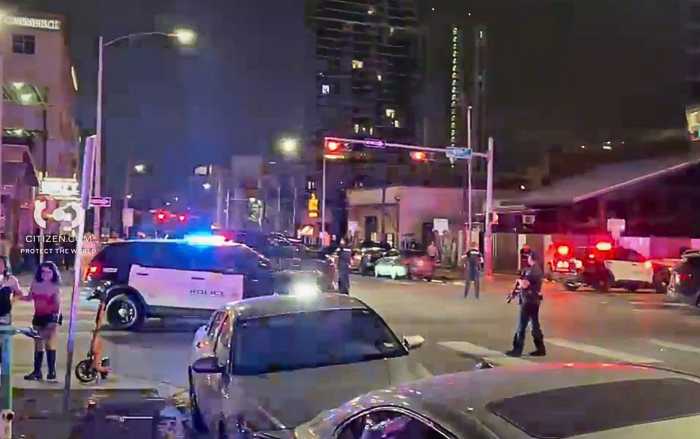CeCe McDonald in GLAAD’s offices on February 20. | GAY CITY NEWS
CeCe McDonald, a 25-year-old African-American transgender woman from Minneapolis, speaks with considerable and informed passion about the ignorance too many people in society have about the transgender community. How that leads to dehumanizing stereotypes. How harassment and violence threaten transgender women, particularly those from communities of color. How the media sensationalizes transgender lives, especially in an obsessive focus on questions of surgical transition. And how transgender people can become victims of what she calls the “prison-industrial complex.”
What McDonald — in a February 20 interview at the Midtown offices of the Gay and Lesbian Alliance Against Defamation (GLAAD) — did not reflect, however, was any hint of bitterness.
Which was very surprising. In January, she was released from a Minnesota correctional facility, 19 months after her sentencing for a second-degree manslaughter conviction that resulted from a 2011 confrontation in which she was attacked by a group of white men and women coming out of a south Minneapolis bar.
After manslaughter sentence in case where she was assaulted, Minnesota trans woman assumes her platform
As the crowd of whites taunted McDonald and her companions with racial and homophobic slurs, Molly Flaherty, whom Hennepin County District Attorney Mike Freeman described to Gay City News as a “biker woman,” smashed a glass against McDonald’s face, causing an injury that required 11 stiches. A melee ensued and one of McDonald’s attackers, Dean Schmitz, 47, who had a criminal record and a swastika tattoo on his body, ended up dead, stabbed by fabric scissors McDonald, a fashion student, pulled from her purse.
Last April, Flaherty was convicted of third-degree assault and sentenced to six months in prison. In contrast, McDonald initially faced second-degree murder charges, and in the end agreed to a plea deal on second-degree manslaughter charges. Her 41-month prison sentence took into account the months she spent in jail between the incident and her sentencing almost a year later. Hersch Izek, McDonald’s attorney, told Gay City News that Freeman “absolutely” overcharged the case in order to compel his client to accept a guilty plea — an assertion the prosecutor contested in speaking with Gay City News.
McDonald’s friends and supporters, as well as transgender rights advocates in the Twin Cities and nationwide, condemned her treatment in the criminal justice system. Mara Keisling, who heads the National Center for Transgender Equality, released a statement saying, “Here we have a justice system that’s criminalized CeCe for surviving… And this is a painful truth for so many other transgender women of color who’ve been victimized by hate and fear.”
In pre-trial hearings prior to McDonald’s plea, the court imposed limits on what an expert witness could testify to regarding the transgender community, a point Freeman conceded to Gay City News. The expert could offer a definition of the word transgender, but evidence from the National Coalition of Anti-Violence Projects that of half of all LGBTQ hate murder victims are transgender women would be barred.
McDonald served her sentence in a men’s prison, and in response to concerns that as a women she risked becoming the victim of violence from male inmates, officials attempted to isolate her from the general population.
How, after enduring a violent assault and then nearly three years of prosecution and incarceration, did McDonald avoid being bitter?
“I was there,” she acknowledged in the February 20 interview.
But she quickly learned that rage was an emotion she couldn’t afford.
“The system wants you to be this bitter person,” she explained. “People who went in for petty drug charges, came out bitter and they went back as murderers. You go in as a sponge. You can soak up all this evil.”
The experience she endured on the streets of Minneapolis had impact beyond her physical scars.
“I had trouble trusting people,” McDonald said, before relating how she overcame that barrier.
“I chose not to be that person,” she said. “I chose not to let this situation break me down… You can fly above that.”
Being punished for what she felt was survival self-defense did not deter McDonald from standing up for herself during her time in prison. When officials in the Minnesota Department of Corrections tried to put her in solitary, under the cover of protecting her, she called on her supporters to lend their voices.
“We called DOC on their bullshit,” she said.
That doesn’t mean McDonald didn’t face problems in the prison’s general population.
“I dealt with a lot of discrimination,” she recalled. “Prison is just like the real world, but condensed into one building. I dealt with people who were ignorant, and others were accepting.
During her 19 months after sentencing, however, McDonald remained unharmed.
“I did not face violence,” she said. “I know how to take care of myself.”
While in prison, McDonald received a visitor who undoubtedly changed her life — Laverne Cox, a transgender actress and activist who has a starring role in the Netflix prison series “Orange is the New Black.” Cox interviewed McDonald there, and with the collaboration of filmmaker Jacqueline Gares, is now producing a documentary film (freececedocumentary.net) exploring McDonald’s case, her advocacy work now that she is free, and the broader context of violence against transgender women of color.
“I am hoping the film will help people see a trans woman as being human,” McDonald said about the film. “The media likes to sensationalize stories of trans women, and so people just see us as drones or robots or less than human. It’s important to show me interacting with my sister and with my friends and doing speaking gigs. I am a real human outside of the incident , outside of being trans.”
Many people, she said, carry stereotypes about the transgender community simply out of ignorance and lack of exposure.
“We are normal, a different kind of normal,” McDonald said. “Hopefully, people will take the initiative to understand who trans people are.”
Using a term that describes those who are not transgender or gender-variant, she said, “Cisgender people, for the most part, think: If it doesn’t affect us, why get involved?”
McDonald, who moved to Minneapolis after growing up in Chicago, admitted that despite experiencing discrimination in the years prior to her arrest, she too was among those who did not get involved in activism. That’s changed.
“I do want to be active as an advocate for trans women because so few have a platform,” she said. “It’s important for transgender women to understand that they can be successful.
That’s a lot of progress from the months immediately following the violent incident in Minneapolis when McDonald experienced suicidal thoughts.
Did the ordeal of the past few years, then, make her stronger?
“Oh, definitely,” McDonald said, without skipping a beat.






































